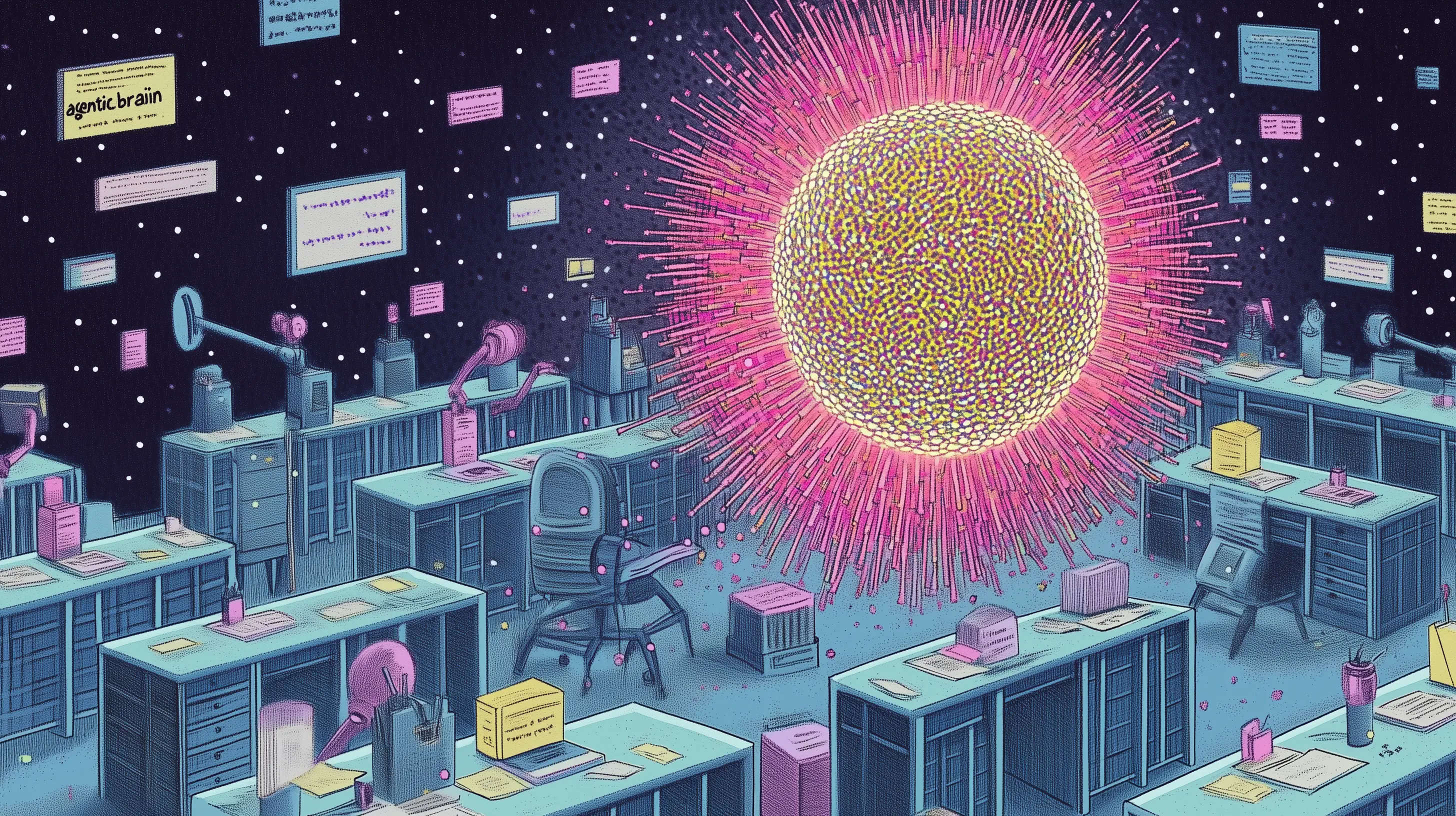How intelligent automation is changing the game for enterprises and SMEs

The most tedious, repetitive, and soul-crushing tasks in your business are disappearing. And if you’re not on top of it, competition will outperform you with more efficient operations.
Picture this: A large recruitment firm where hundreds of recruiters lose over 25% of their time to administrative busywork. Document creation, data entry, form filling. While competitors that have automated these tasks are out there closing deals and building relationships. The firm has its talented professionals trapped in Microsoft Word templates and spreadsheet hell.
It's a silent killer of competitive advantage.
Traditional automation promised to solve this. Robotic Process Automation (RPA) gave us rigid, rule-based scripts that could handle basic tasks. But when something unexpected happened or unstructured data appeared, these systems failed spectacularly. The real work still required human intervention.
Enter agentic automation: AI that doesn't just follow instructions, it thinks and it can deal with unstructured data without the interference of your employees. This technology represents the next leap in business efficiency, moving beyond simple task automation to intelligent, goal-oriented systems that can reason, adapt, and make decisions autonomously. For both large enterprises and forward-thinking SMEs, agentic automation is unlocking true hyperautomation and delivering quantifiable ROI that would have seemed impossible just years ago.
The high cost of "boring work"
Most businesses are still drowning in operational friction. Legacy systems that refuse to talk to each other. Data locked in silos across departments and across multiple tools and databases. Manual processes that take hours when nowadays they can take minutes.
Take that recruitment firm. Their best recruiters, the ones who could be generating millions in revenue, spend over a quarter of their day on document creation and administrative tasks. Not relationship building. Not strategic thinking. Not closing deals. Administrative busywork.
This pattern repeats across industries. Financial services firms still rely on manual data entry for loan processing. Logistics companies track shipments through disconnected systems that require constant human intervention. Manufacturing plants deal with equipment failures reactively instead of preventing them.
Off-the-shelf software and basic RPA can't solve these problems because they lack the intelligence to handle complexity. They break when faced with unstructured data, novel situations, or processes that require reasoning across multiple systems. This creates an enormous gap between what businesses need and what technology can deliver.
Besides all this, there is a huge hidden cost to this all: employee morale. When your best people spend their days on work that brings them no joy and adds questionable value, you're not just losing productivity but also talent, creativity, and competitive edge. Talent will flee to organizations with better systems that allow the employees to do what they do best.
Beyond automation to agentic AI
Agentic, or intelligent automation is like having an expert-level project manager who lives inside your company's software systems. But unlike a human project manager, this digital coordinator can handle infinite tasks simultaneously, never gets tired, and continuously learns to optimize its approach.
The difference between traditional RPA and agentic AI is the difference between a script and a problem-solver. Traditional automation follows predetermined rules: "If this happens, do that." The moment it runs into a problem or data that does not fit the programming, the automation stops. Agentic systems understand objectives: "Here's what we need to accomplish, figure out how to do it."
UPS's ORION system exemplifies this approach. Instead of following fixed delivery routes, ORION analyzes real-time traffic, weather conditions, and package priorities to dynamically optimize routes. The result? Over $400 million in annual savings. The system doesn't just automate delivery but it also actively thinks about the delivery strategy.
In manufacturing, General Motors deployed AI to monitor assembly line robots, identifying early signs of wear before failures occur. This predictive approach reduced unexpected downtime by 15% and saves $20 million annually. Frito-Lay achieved similar results, preventing critical component failures and gaining 4,000 additional production hours.
These systems work through three core components: a "brain" that plans and reasons about objectives, "tools" that can interact with various software systems and data sources, and "memory" that learns from past experiences to improve future performance. The AI understands context, adapts to new situations, and optimizes its approach over time.
The business case for SMEs and enterprises
Most people still get this part wrong and are used to the business cases automation projects brought in the last decade. Relatively high costs and sometimes questionable results. The costs of software engineering is dropping, while the output of the delivered software is significantly increasing.
That recruitment firm we talked about earlier is an actual case we’ve had. They invested €150-200k in a suite of intelligent automations. The system took over document creation, candidate screening, data quality, and administrative workflows. Hundreds of recruiters suddenly had 25% more time for sales and relationship building. The direct result? Significant revenue increases and cost savings that far exceeded the initial investment.
The business case is also becoming more compelling for smaller operations. An energy firm we’ve worked with that processes large volumes of B2B energy contracts invested $50-60k in intelligent automation for their contract processing, customer service, and making sure contracts were renewed on time. The system eliminated the need for five full-time employees in their business. Which can lead to cost savings or to extra revenue in the case these employees could focus on more commercial matters.
An outsourcing company with 300 employees faced similar administrative bottlenecks. Resource scheduling and time registration consumed five full-time positions. After implementing intelligent automation for around $80-100k, they reduced that team to a single person who now handles edge cases and ensures the quality control. The investment paid for itself in less than a year.
These cases are far from outliers. A Harvard Business School study found that specialists using AI completed 12.2% more tasks, finished them 25.1% faster, and produced 40% higher quality results compared to those working without AI assistance.
Working with the right technology partner to solve the right problems can turn modest investments into tenfold returns through cost savings and revenue increases.
Lead the transformation or scramble to catch up
I believe the competitive landscape is shifting rapidly. While some businesses cling to manual processes and legacy systems, others are leveraging agentic automation to unlock unprecedented efficiency and growth. Where many businesses have gotten away with an inefficient operation over the past decade, they will be outperformed in the next decade. Inefficiency meant fewer profits and more headaches than your efficient competition. In the near future it will mean the downfall of a company.
I am not saying that we need to replace everyone with machines. But I am all for freeing talented humans from work that drains their energy and prevents them from creating real value. Every business can at least start identifying workflows that are genuinely boring and where employees add minimal value or would rather focus on more strategic work. Once defined and estimated the impact and efforts of these projects, apply intelligent automation to eliminate that friction.
The recruitment firm's story illustrates this perfectly. By automating administrative tasks, they didn't eliminate jobs, they elevated them. Recruiters became pure relationship builders and strategic advisors instead of document processors.
The technology exists. The business case is proven. The question isn't whether agentic automation will transform your industry, it's whether you'll be leading that transformation or scrambling to catch up. Smart businesses are already mapping their boring workflows and discovering which processes are perfect candidates for hyperautomation and AI.
In a world where AI can handle the routine, human creativity and strategic thinking become your ultimate competitive advantage.



.webp)


















.webp)

.webp)





.webp)






%20(1).webp)







.webp)
.webp)


